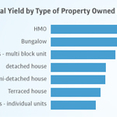How to Avoid Property Fraud
Upad takes a look at some common types of property fraud and how to protect yourself
Property rental fraud is big business for conmen, with many walking away with £1000’s in deposits or from property hijacking. Landlords and tenants are both victims of fraud and it’s important to understand how it works to avoid it happening to you.

Property hijacking, as it is known, is where a landlord’s identity is stolen by criminals in order to sell their rental property. This type of crime has tripled in the last four years, with an estimated £25 million made by fraudsters.
A criminal will first go about stealing your identity, using your name as the owner of the property to obtain fake identification and then use this to sell your property to an unsuspecting buyer.
Fraudsters obtain this information by posing as a prospective tenant, changing their name by deed poll and then applying for a passport. Once they have access to the property, they can show prospective buyers round and sell it before you have any idea of what’s going on.

How can you protect yourself from this type of fraud? Before you go assuming a stage name. follow these tips;
- Register with the Land Registry, it means you can receive email alerts if anyone applies to switch the ownership of your property to a new name or try to use it for a mortgage
- Put a restriction on your property, which means it can’t be sold or re-mortgaged unless a solicitor certifies the application was made by you
- Conduct thorough referencing on tenants, make sure to check their ID, credit history, current employment and previous landlord. The latter should be able to verify the tenant is who they say they are
- Be wary if a tenant seems in a rush to move in quickly, there can be legitimate reasons for this but you should investigate
- Visit the property a few days after the tenant has moved in (with 24 hours’ notice) to make sure they are living there, fraudsters of this type generally won’t physically move in to the property
- Check on tenants periodically during the tenancy- usually every 6 months unless you have cause for concern
Now on to property fraud risk for tenants, who are the more likely target for criminals because they are required to share personal information in order to rent a property.

The most common type of fraud is to advertise property details at a very low rent, inevitably receive a huge number of enquiries from tenants that can’t believe their luck and subsequently ask for large deposits to ‘secure’ the property. With a large wad of a deposit, and no contract signed (and perhaps not even a real property), the fraudster runs off leaving the tenants out of pocket. Tenants can protect themselves by doing the following;
- Never hand over a holding deposit without first seeing the property, meeting the owner and having terms agreed subject to contract
- Don’t pay a security deposit until you have seen the contract
- Check ownership details on the Land Registry, it’s very cheap to do
- If it seems too good to be true, it probably is! Whilst lower than general market rates can happen, if it’s 20% or more cheaper than any other property in the area, you’re probably looking at a scammer
For both tenants and landlords, they need to be vigilant when it comes to online scams- especially with personal information and financial transactions needed to let and rent properties. As an online company, Upad need to be vigilant about scammers too. Our Approvals team manually checks every single advert that is placed with Upad. This is to ensure that portal criteria is met, along with ensuring that an ad that is suspiciously underpriced does not go live to unsuspecting tenants and that the owner of the property is the one advertising the property, or has permission from the owner to do so.
We check ownership using the Landmark Register and if there’s no match, we ask for further proof from the person advertising- such as a mortgage statement or utility bill. To comply with data protection, when a tenant makes an enquiry about a Upad property, we will only send their details onto the landlord if they agree to do so with a secondary link sent from Upad.
Other scams you should keep an eye out for;
Suspicious Sender: Firstly, never open an email that looks suspicious. If you’re not sure, ask the sender to verify the information but never click on any links in an email if you can’t be sure who sent it.
Updating Details: Check with a company over the phone if you’re asked to update any personal or financial details, or contact your bank. No legitimate company would need you to ‘urgently’ update your details. Always double check, and if it’s a scam (it probably is) then delete it.
Passwords: As difficult as it can be to remember them all- don’t use the exact same password for all of your accounts. If your details are stolen, at least most of your accounts will be safe. Try varying the numbers or capitalization you use on a memorable word.
Other tips from the National Crime Agency include;
1: Never open emails from an unknown source
2: Don’t respond to anti-virus software messages that pop up online
3: Install anti-spyware
4: Use a firewall
5: Make sure your computer software is bang up-to-date as this will include the latest security measures.
Advertise your property with Upad, who go the extra mile to ensure landlords and tenants are both protected from fraud.









